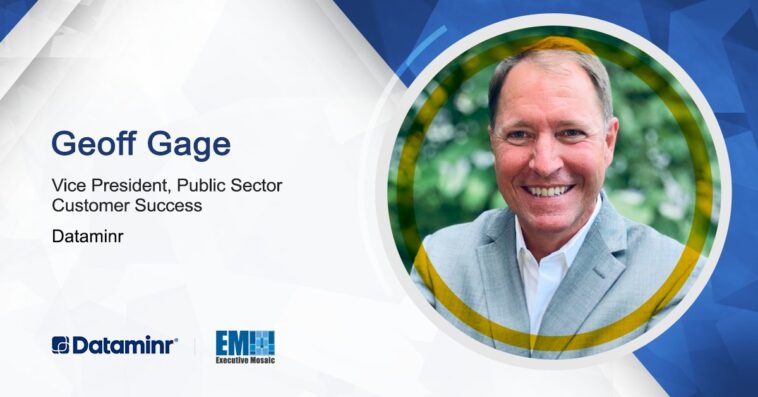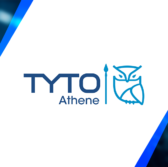Geoff Gage, vice president of public sector customer success at Dataminr, came to the company following an extensive career with the U.S. Navy. He was drawn to the company for the opportunities it provided to continue supporting national security missions, work with “an amazing team of customer success experts” and learn more about artificial intelligence and business.
At Dataminr, Gage works to deliver the company’s First Alert platform – a “cutting edge technology helping our clients save time, money and lives” – to DOD customers. He views the current era as an exciting time to be in the AI space and bring this technology into the public sector.
In a recent Executive Spotlight interview, Gage took a deep dive into today’s most pressing national security challenges, offered a look into Dataminr’s culture and explored the ways in which it contributes to the company’s ongoing expansion efforts.
What do you think are the most pressing national security threats we’re facing today? How is your organization addressing these threats?
One of the biggest challenges today is that our problems are so complex there is no singular solution across different scenarios. It would be a folly for an organization – whether it’s a government organization as large as the DOD or an up-and-coming commercial organization – to claim that they have the solution to everything.
There are three interconnecting issues that I have my eye on, the first being geopolitics. Today, we face significant geopolitical threats. Throughout my time in the Navy and more recently in the Pentagon, I had the opportunity to deepen my appreciation of the challenge from a defense and military standpoint.
China is a really significant, long-term threat because they have a vision of a world order that is not compatible with that of the United States and our allies. Russia is arguably a more immediate threat. While they do not have as coherent a vision for the future, they will do everything they can in the near term to undermine the current system. They’re nuclear-armed with nefarious intent, and are now increasingly working in collaboration with the Chinese, exacerbating the challenge. We also need to keep an eye on the Middle East, where Iran continues to offer a different vision of order in the region. Further to the east, North Korea continues to pose a significant threat, and is interwoven with these other nations. There is also the ongoing threat from violent extremism, both domestic and international.
The second big challenge I see is that of climate impacts. In some places, things are getting warmer, while in others, they’re getting drier or even wetter. These shifts have ripple effects, resulting in changes like population migrations, and are challenging us to adapt to new conditions. This is happening on a global scale, from the poles to the equator and all around, which interplays with geopolitics.
The third challenge is the fraying of our domestic political fabric. That by itself is not necessarily a major national security challenge, but when viewed through the lens of the two previous challenges, we need to be concerned about our resilience. If one of our geopolitical rivals like China or Russia takes action or a major climate-related event occurs, I have concerns about our ability to rise and meet the challenge if it also happens during a difficult time in our domestic political arena. But ultimately, I’m an optimist, and I think that we will be able to do so.
One of the reasons why I am so bullish on Dataminr as a company and our product is because so many of those challenges I described play out every day in publicly available information. What Dataminr brings with its AI platform is the ability to actually make sense of all that information and turn that data into actionable, useful knowledge our clients can use to prevail in this complex geostrategic environment. Our AI platform alone cannot solve all of these big problems, but I know from client feedback that we are making an impact.
What are Dataminr’s core values? How do you think these values translate into continued success and growth in the GovCon market?
At Dataminr, we refer to four culture drivers as a touchstone for everything we do. The first culture driver is ‘own it.’ The second one is ‘find a better way.’ The third is ‘bring others along,’ and the fourth is ‘drive results.’
Owning it is essentially putting an emphasis on and taking charge of our personal responsibilities and opportunities at Dataminr. It could be a very minor administrative task, or it could be a really significant project that I’m leading – owning it covers everything. This ties into the second culture driver, finding a better way, which means being empowered and expected to find the best possible way to get the job done – whether it’s more efficiently, more effectively or in a more cost-wise manner. It’s one thing to tell someone they own something, but if you don’t empower them with the resources they need and the charge to make it better, then you’ll be stuck treading water.
Throughout my career, I’ve learned that as much as you want to own something and figure out the best way to do it, the best results are achieved when you do it as a team. This is represented in the third culture driver – bring others along – which can mean something as basic as building a team, getting folks together, building a common understanding of a challenge that needs to be addressed and figuring out approaches to solve it. It also means mentoring and developing our people professionally and personally, which is another critical way that we ultimately achieve the fourth core behavior: drive results. Ultimately, as a business, we have to achieve results, which ties everything together.
These culture drivers are not necessarily unique to Dataminr, but I would argue one of the reasons why they’re so powerful is they are somewhat universal to any high performing organization. A common denominator across all of them is sharing the same mission-driven purpose that we share with our client. From a public sector perspective, those are shared values and shared characteristics of the way we do business, which ultimately boils down to mission-driven purpose. These values create teams and individuals at Dataminr who are very committed, whether it’s through AI engineering and product development, sales, or customer success.
What is your strategy for attracting and retaining top-level talent in the midst of ongoing talent shortages in today’s highly competitive market?
As a company, Dataminr has grown a lot over the past decade. We were founded around a unique and singular vision to make sense of publicly available information by harnessing the power of technology.
From my perspective of recruiting client-facing talent, we in large measure have done it by word of mouth and building a strong reputation. When I get the opportunity to meet my industry peers, whether in software as a service, the AI business or defense contracting in general, I take note of how they communicate their value with clients, and I always come away impressed with how competitive the environment is and also how amazing my Dataminr teammates are. Through our culture drivers, we have created world-class customer success experts within Dataminr. Many of the people we hire are either referrals from our teammates or individuals who heard about Dataminr through people they know.
Also, as I’ve discussed, we have a really unique, category-defining capability: our AI platform for real-time event detection. When people learn about our product, about the mission impact we have, and meet our amazing team, they want to work at Dataminr. Together, these elements draw top talent and ultimately become a self-reinforcing retention tool.





